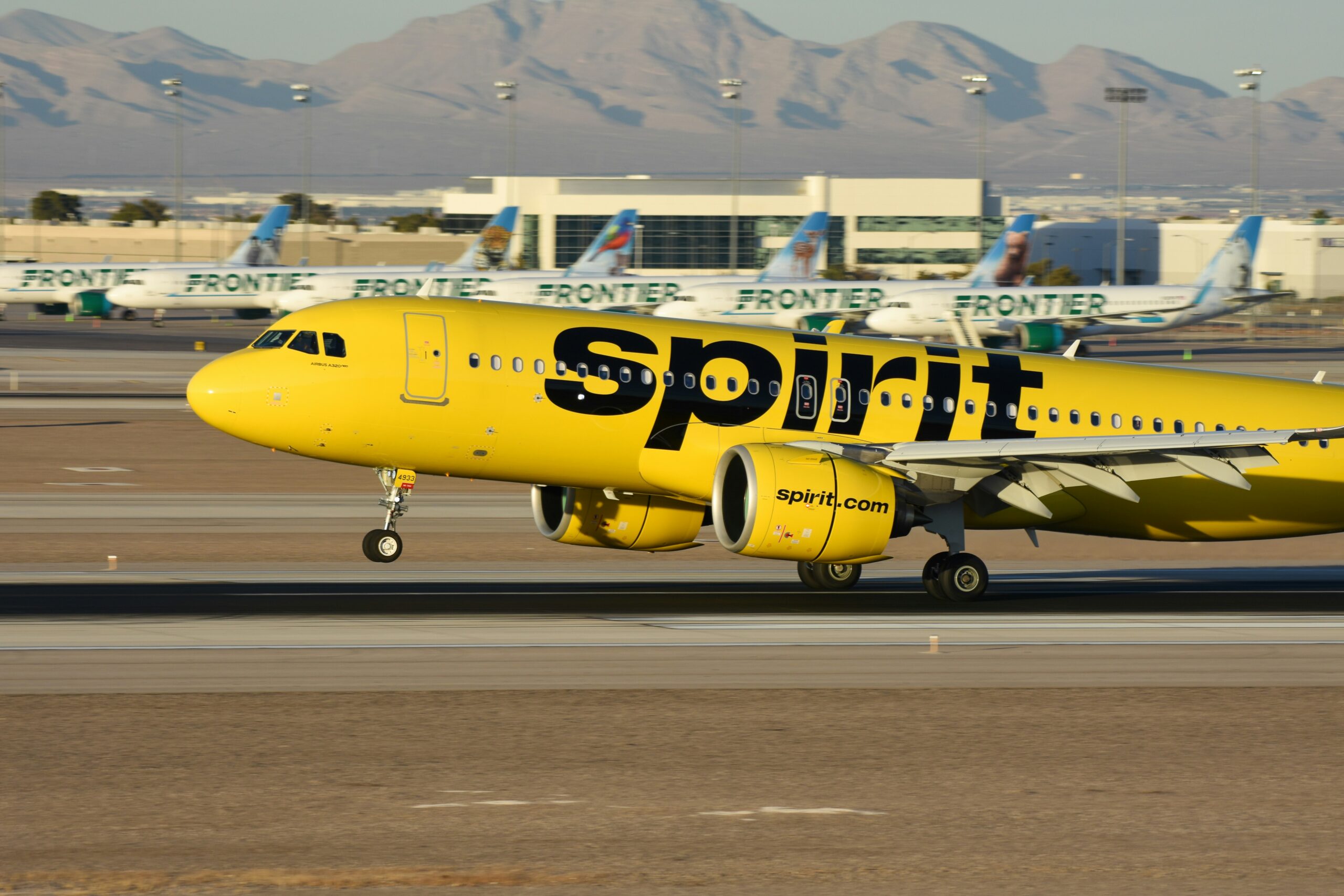Interview: Turkish Airlines Chairman Announces Two New U.S. Gateways
Exclusive interview with Turkish Airlines Chairman, Dr. Ahmet Bolat: the vision, challenges, and ambitious plans for the future of the airline
by Lark Gould
May 8, 2023

Photo: Turkish Airlines Business Class Flying Chef. Courtesy of Turkish Airlines.
If you want to look at a broad history of civilization, look to Turkey. If you want to look at the future of commercial aviation, look to Turkish Airlines.
The airline, now the world’s largest network carrier, just announced a net profit of $233 million in the first quarter of 2023, when many carriers are cutting routes and services after taking some heavy punches during the pandemic.
Turkish Airlines led the way by being the first of Europe’s network airlines to fully recovered from international shut-downs during the Covid-19 pandemic – possibly due to its early return to many parts of the world.
The airline saw a record-high first-quarter revenue, up 43 percent year-on-year, with passenger revenues accounting for 84% of total revenue. The airline, meanwhile, has been adding to its fleet and boldly expanding its route networks at a clip – most recently adding Krakow, Poland, as a destination and Latvian airline airBaltic as a codeshare partner.
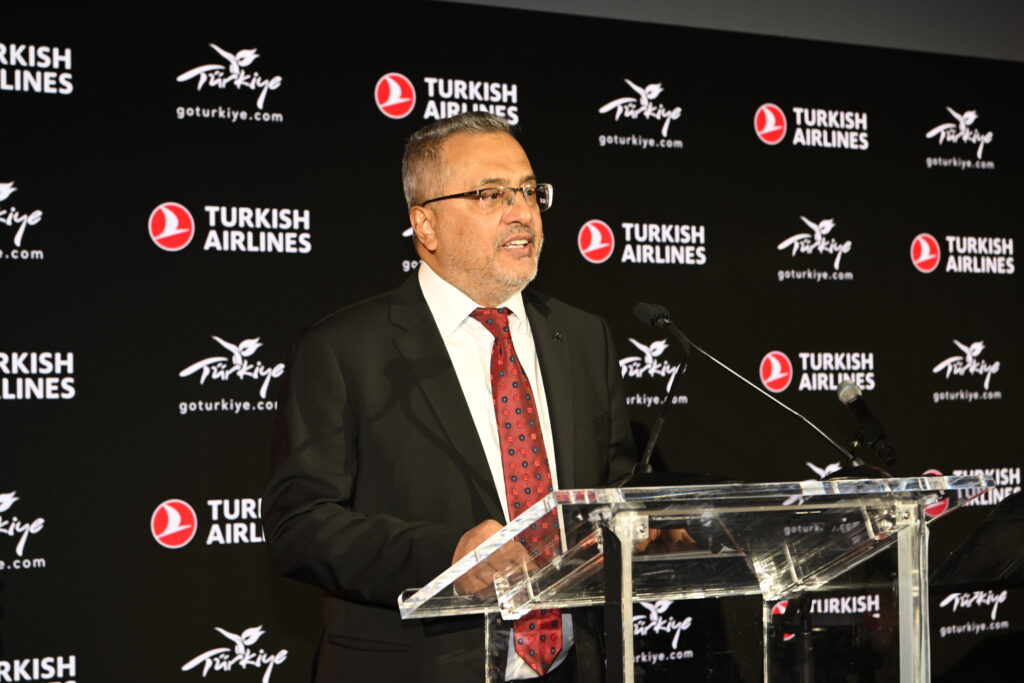
Photo: Chairman Ahmet Bolat. Courtesy of Turkish Airlines.
In the U.S., Turkish Airlines flies to 12 gateways, with more on the way: the airline plans to open two new gateways this year—Denver and Detroit —both expected to launch in Q4 2023.
Business Traveler spoke to Dr. Ahmet Bolat, Chairman of the Board and Executive Committee at Turkish Airlines, about the airline, its vision, challenges, and things to come.
Turkish Airlines has expanded its route network significantly in recent years. What new destinations are you planning to add to your network?
In the United States, we currently have 12 gateway cities that fly directly to Turkish Airlines’ home base in Istanbul, including Atlanta, Washington, D.C., New York, Newark, Chicago, Houston, Dallas, Miami, Boston, San Francisco, and Los Angeles. In 2022, we introduced the Seattle Gateway, the airline’s first-ever Pacific-Northwest route.
Later this year, we will welcome our 13th and 14th gateways with the openings of Detroit and Denver.
What strategies is Turkish Airlines using to remain competitive in the rapidly changing airline industry, and how do you ensure the company stays ahead of the curve?
When it comes to remaining competitive, in addition to our unparalleled connectivity, U.S. travelers will be especially enticed by Turkish Airlines’ premium travel experience with our new and young fleet, world-class service, award-winning cuisine, and world-famous Turkish hospitality.
Specifically looking at 2023 and beyond, we have ambitious plans and projects focused on promoting travel to Turkey for Americans traveling from the United States. Our goal is to increase this to 2 million visitors per year. Our target capacity increase in 2023 is 15%.

Business Class, Boeing 777-300ER. Photo: Courtesy of Turkish Airlines
Turkish Airlines is poised to solidify its position as a major global aviation player with a strategic plan that focuses on growth, efficiency, and generating new revenue streams. The airline’s ambitious targets for the next ten years include expanding its fleet to 435 aircraft by 2023 and over 800 by 2033, doubling passenger capacity with an average annual growth rate of 7%, and servicing 170 million passengers by 2033, contributing 140 billion USD to Türkiye’s economy by 2033, and achieving an EBITDAR margin between 20% and 25% during 2023-2033.
Other targets include expanding its passenger network to 400 destinations, doubling transported cargo volume, and positioning Turkish Cargo among the top three cargo carriers globally by 2033. Turkish Airlines also plans to leverage the capabilities of its cargo hub, SmartIST, which is currently one of the largest air cargo terminals in the world.
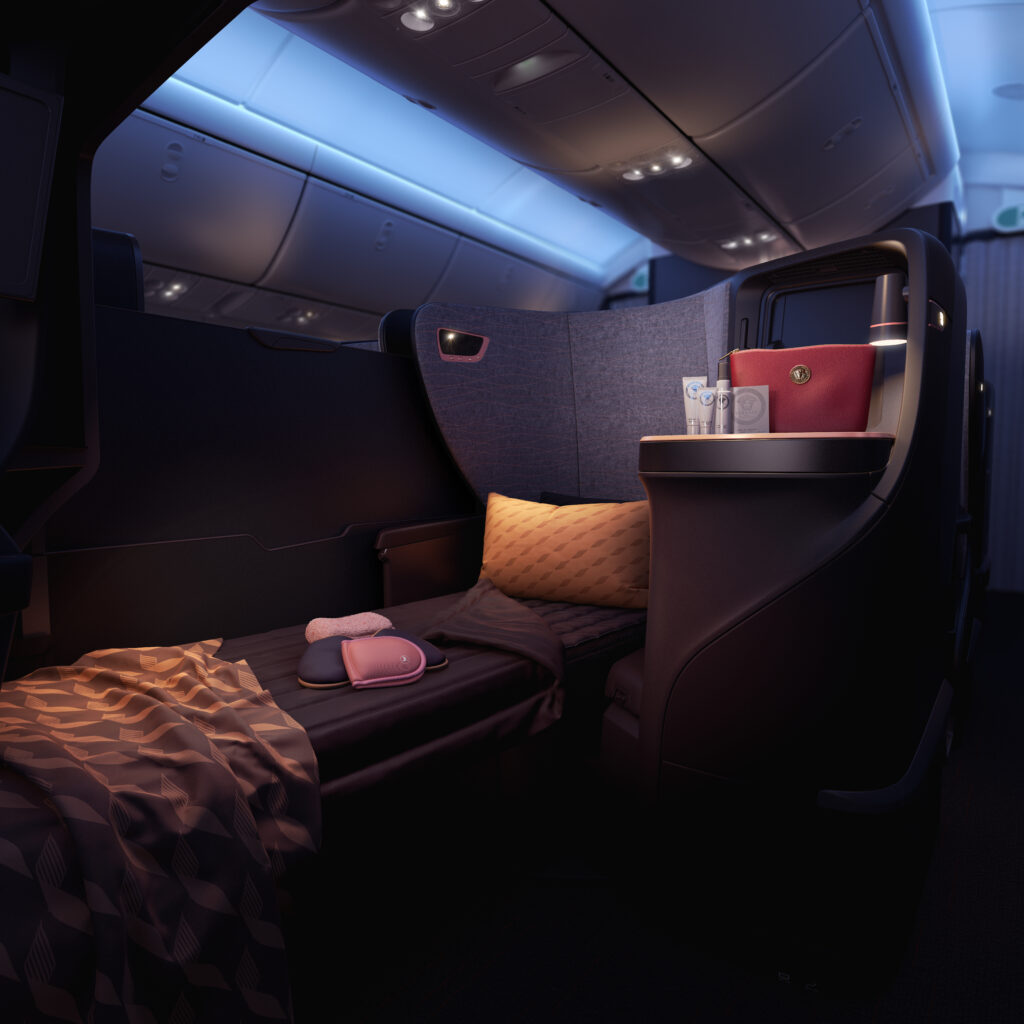
Business Class, Boeing 787-9 Dreamliner. Photo: Courtesy of Turkish Airlines
The airline aims to establish its low-cost arm, AnadoluJet, as a separate subsidiary and reposition its brand while restructuring its revenue and cost structures. Furthermore, Turkish Airlines plans to reach a fleet size of 200 new-generation aircraft to strengthen its competitive positioning.
With these goals, Turkish Airlines intends to reach consolidated revenue of over 50 billion USD by 2033, making it one of the most important players in global aviation. The airline is also expected to increase its workforce to 150,000 employees, including subsidiaries.
How does Turkish Airlines cater to business travelers’ unique needs and preferences, and what specific services and amenities are offered to this market segment?
World-renowned Turkish hospitality and our dedicated staff are the foundation for the premium traveling experience Turkish Airlines offers, with award-winning Business Class services – including on our 787-9 Dreamliners, which are the crown jewels of our young and fast-growing fleet, which feature our all-new, bespoke Business Class cabins.
Business Class passengers can enjoy modern full flat seats with a first-rate entertainment system, free WIFI service on all wide-body fleet, active noise-canceling headphones by Denon (on flights 8 hours or longer), a special amenity kit, a welcome drink and dedicated bar, turn up service and sleeping kit (on flights 8 hours or longer), a snack bar, Turkish coffee, and Turkish delight service, a special menu with gourmet meals, hot towel service, dedicated lavatory with live plants, and more.

Photo: Courtesy of Turkish Airlines
In the all-new Business Class, lighting scenarios draw inspiration from the colorful sunsets of Turkey’s central Cappadocia region and idyllic turquoise beaches, a modern, traveler-friendly 1-2-1 layout offers all aisle access to Business Class passengers, enhanced privacy panels, personal closed stowage space, self-care mirror, and wide cocktail table maximizes space to provide ultimate comfort and introduces a privileged experience.
Business Class passengers can also access Turkish Airlines lounges in select airports and the state-of-the-art Turkish Airlines Business Lounge at the new Istanbul Airport. The Business Lounge is available to Turkish Airlines or Star Alliance Airlines Business Class passengers, accommodating up to 720 passengers across a choice of spaces decorated in a contemporary design with elements of Turkey’s rich cultural heritage.
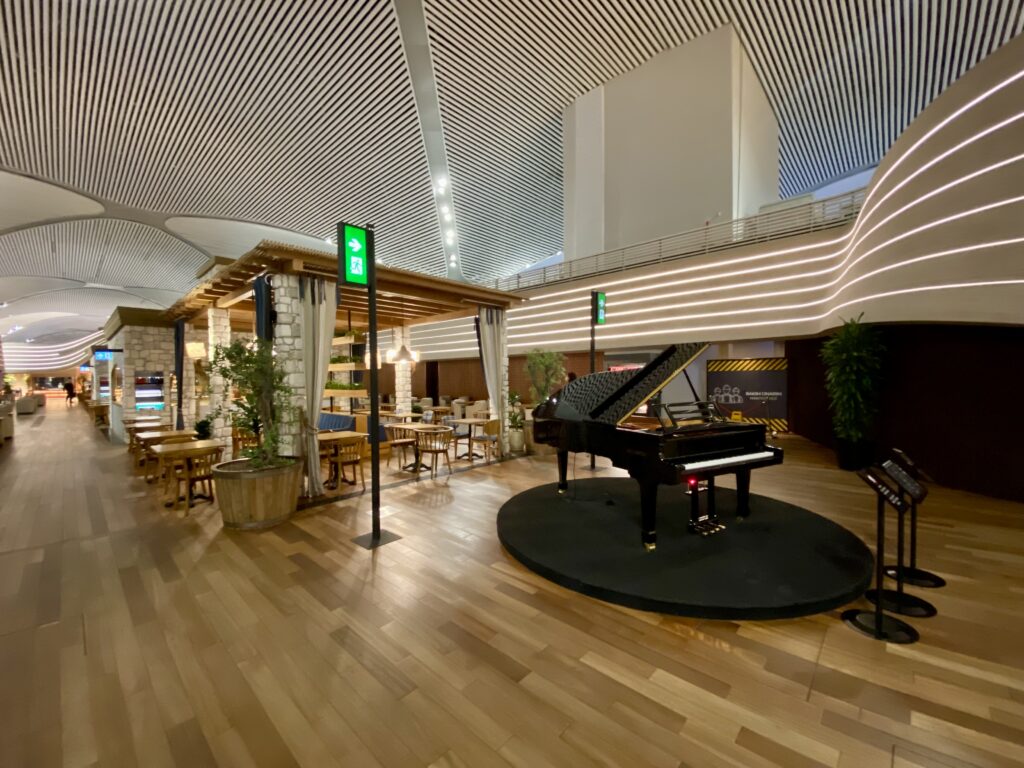
Photo: Turkish Airlines Business Class Lounge, Istanbul Airport. Courtesy of Enrique Perrella.
Corporate travelers can make the most of the business facilities; six private meeting rooms are available and equipped with video conference and teleconference facilities. A large selection of international newspapers and magazines are available daily. For those with a longer wait, private suites are available for guests, with modern shower and bathroom facilities, changing rooms, and ironing services.
Turkish Airlines places a premium on the value of business and corporate travelers, offering programs such as the Turkish Airlines Corporate Club, one of the world’s most extensive corporate frequent flyer memberships with special perks and benefits. Perks include exclusive annual discounts, extra baggage, flexibility and free tickets, upgrades, and access to passenger lounges.
How is Turkish Airlines adapting to changing sustainability trends, such as a growing preference for sustainable and eco-friendly travel options, where possible?
Turkish Airlines is putting sustainability at the center of its business model and was awarded the “Airline Sustainability Innovation of the Year” award by CAPA – Centre for Aviation for its innovative efforts within sustainability.
The airline won this award within the scope of sustainable innovation with the “Microalgae Based Sustainable Bio-Jet Fuel Project (MICRO-JET)”, in which it worked closely with scientists to develop the world’s first carbon-negative sustainable aviation fuel (SAF). It is aimed to produce biofuels from microalgae using hydro-processed fatty acids and hydrothermal liquefaction methods.

Photo: Turkish Airlines Business Class Lounge, Istanbul Airport. Courtesy of Turkish Airlines.
Turkish Airlines plans to use this biofuel, which will be obtained from sustainable sources and is a project output that contributes to nine of the United Nations Sustainable Development Goals, in its flights after the engine tests to be carried out by Turkish Technic. When the national flag carrier uses this fuel, it will be one of the few global companies that can use the cleanest biofuel.
Can you discuss some challenges Turkish Airlines faces as a global airline operating in a politically volatile region?
While the travel industry faces ongoing challenges, including the COVID pandemic and, most recently, the Turkey earthquake, we remain resilient and flexible in adapting to change to continue moving forward.
As tourism is one of Turkey’s major economic drivers, Turkish Airlines proudly flies Turkey’s flag, encouraging travel to the destination through its vast route network, flying to more countries than any other, and through its Istanbul Stopover program.
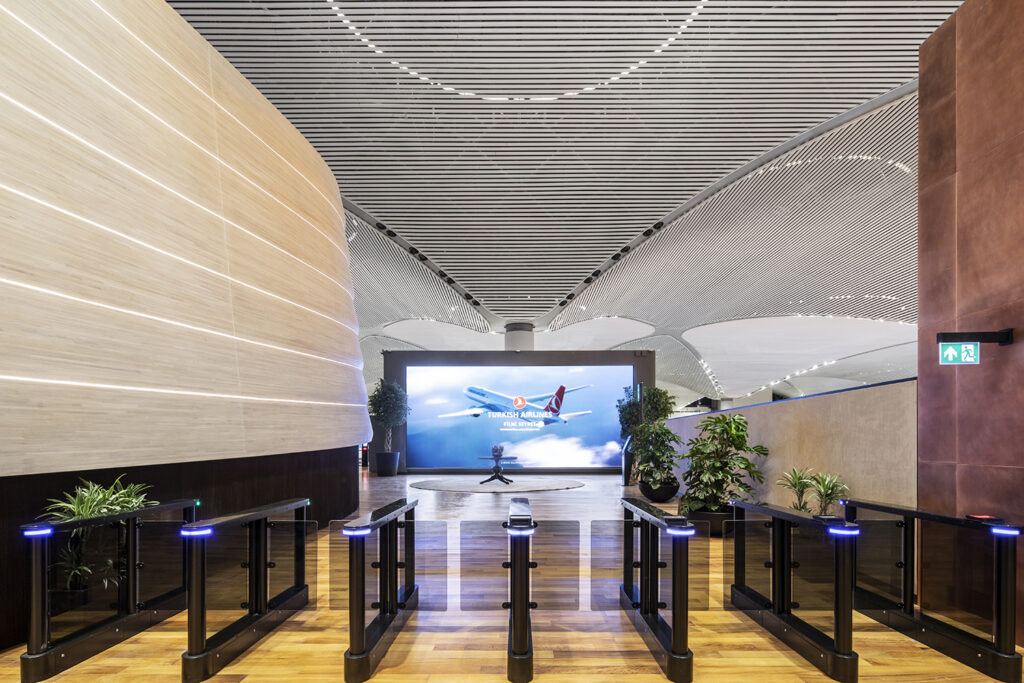
Photo: Turkish Airlines Business Class Lounge, Istanbul Airport. Courtesy of Turkish Airlines.
Turkey is a beautiful country – filled with incredible tourist experiences and people. Our goal is to educate travelers so they understand that Istanbul and surrounding tourist attractions and destinations are safe to visit and continue to welcome travelers with open arms.
Finally, how do you see the future in light of increasing political disruptions, climate change, declining petroleum stocks, inflation on all fronts, and ever-increasing populations relying on the earth’s dwindling resources?
Turkish Airlines is focusing heavily on implementing initiatives that support a more sustainable future for the company, such as the world’s first carbon-negative sustainable aviation fuel and the aviation industry as a whole. We strive to serve as pioneering airlines in implementing clean biofuel. While our goals are to increase routes and passenger load over the next ten years, sustainability is certainly at the center of those plans.
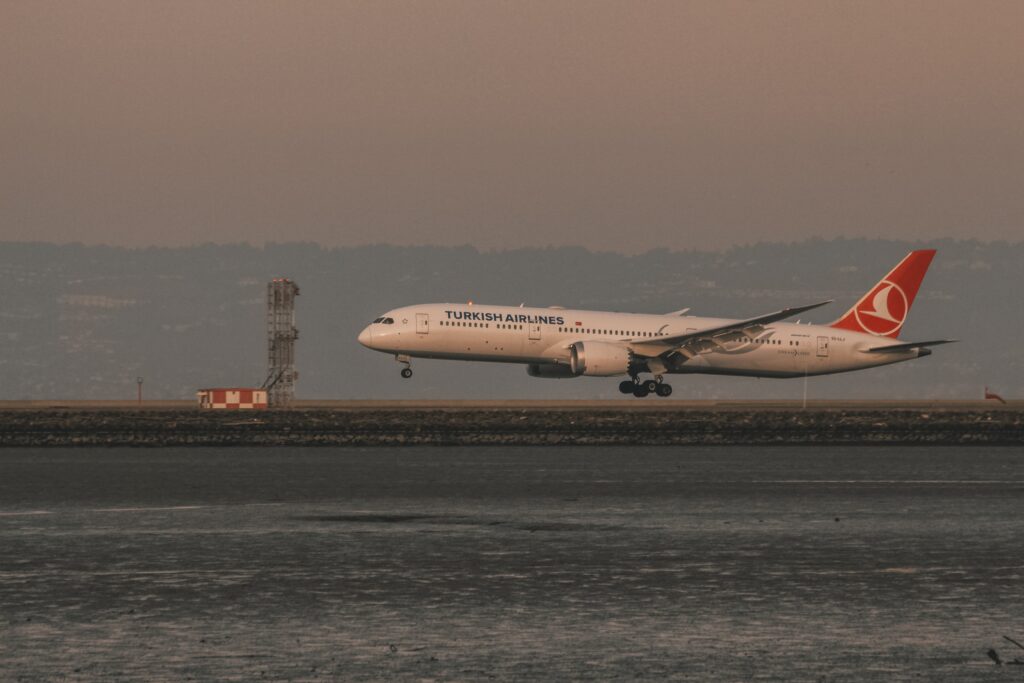
Photo: Turkish Airlines, Boeing 787-9 Dreamliner. Courtesy of David Barajas / Unsplash
As another growing trend, the medical tourism industry is an emerging sector that Turkish Airlines is invested in supporting. While known to many in Europe, Americans may be surprised to learn that Turkey, the world’s 6th most popular tourist destination attracting 40 million visitors, offers high-quality healthcare services from internationally accredited medical facilities and staff bolstered by a 150-year-old healthcare education system offering services accessible in 20 different languages and 30 different dialects.
With one of the most comprehensive route networks, Turkish Airlines’ “Heal in Turkey” initiative can bring passengers from numerous countries around the world to Turkey for medical and health reasons to support the promotion of health tourism in Turkey. With treatment expenses around 35 to 60% more affordable than in the U.S. and our beauty and tranquility as a site for recovery, Turkey is poised to become a major destination in global medical tourism.



